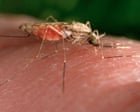
Amidst a backdrop of significant global and political changes, recent news highlights both emerging challenges and stories of individual courage and compassion. In Zimbabwe, a resurgence of malaria cases prompts international focus, while in the United States, policy shifts under the Trump administration bring deep implications for both scientific research and foreign aid. Meanwhile, an inspiring act of heroism by a former baseball player reminds us of the profound impact of individual bravery.
Zimbabwe, a country that has made substantial progress in controlling malaria over the years, faces a significant setback as reported cases of the disease have surged dramatically. This comes in the wake of the United States halting critical funding previously allocated for malaria research and containment. The sharp rise in malaria outbreaks, from just one in the previous year to 115 currently, has alarmed health experts. The withdrawal of funding not only threatens ongoing efforts but also poses a severe risk to the population as shortages of essential tools like mosquito nets become more acute. Zimbabwe’s struggle highlights the interconnectedness of global health efforts and the challenges that arise when support is withdrawn.
In another development impacting global health, the Trump administration’s decision to destroy nearly $10 million worth of long-acting contraceptives intended for overseas aid has raised concerns. The plan, reportedly to be completed by the end of July, involves the disposal of contraceptives such as IUDs and implants that were primarily destined for women in Africa. This decision, which carries an additional cost to taxpayers, emphasizes the shifts in U.S. foreign aid policy and its implications for reproductive health services abroad. It reflects a larger trend of reevaluating international aid commitments under the current U.S. administration.
Within domestic borders, the scientific community is experiencing significant upheaval. The recent Supreme Court decision empowering Health and Human Services Secretary Robert F. Kennedy Jr., known for his controversial stance on vaccines, has enabled substantial changes at the department. The dismissal of advisory panels and the halting of scheduled meetings signal a politicization of science at key agencies. This shift raises concerns among health experts about the long-term impacts on healthcare and scientific research. The changes highlight the critical role of policy in shaping science and underline the need for mindful consideration of evidence-based practices in policy-making.
Amidst these broader societal changes, an individual story of heroism emerged from South Carolina, where former professional baseball player Chase Childers tragically lost his life while rescuing five people from drowning. Childers, who had transitioned to a career as a police officer, demonstrated extraordinary bravery and selflessness during a family vacation. His actions, witnessed by his wife and three children, have touched many, underscoring the enduring human spirit and the capacity for courage in the face of danger.
These stories, while varied in their scope and impact, collectively bring attention to both pressing global issues and heartening personal narratives. As countries navigate complex challenges, from public health transformations to policy-driven changes, the human capacity for courage and compassion remains a constant source of inspiration. Through mindful reporting and reflection, we can continue to foster an understanding of the interconnected world we inhabit, enhancing our shared resilience and empathy.
Source: {link}
